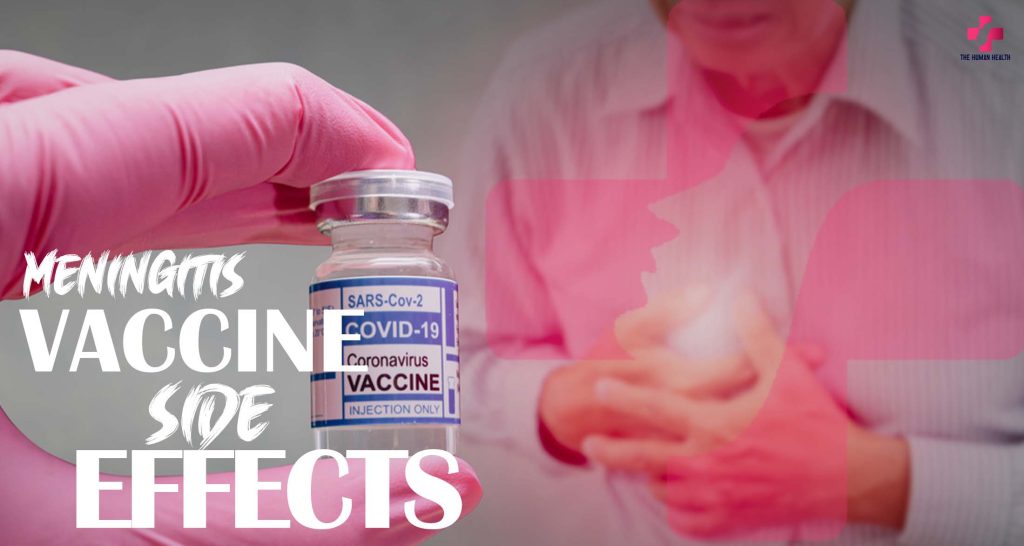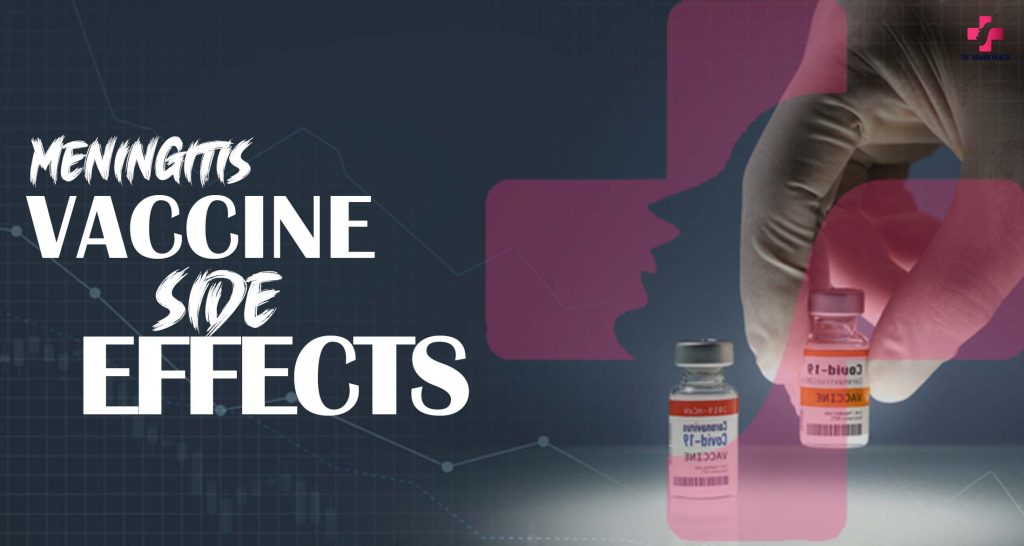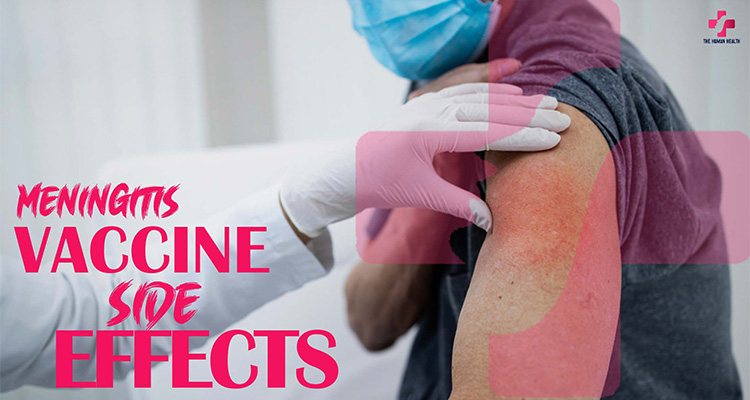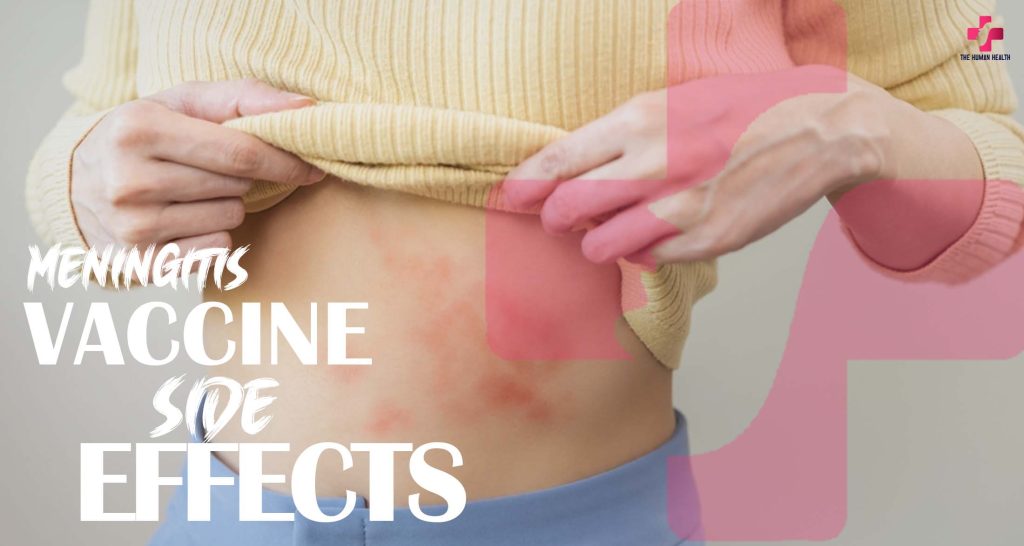Meningitis Vaccine Side Effects
Meningitis Vaccine Side Effects
Meningitis is a serious illness. It causes swelling around the brain and spinal cord. Germs like bacteria and viruses can cause it. Bacterial meningitis is the most dangerous. It can cause big health problems or even death. But vaccines can help prevent it. Some vaccines protect against common causes of bacterial meningitis. These include Neisseria meningitidis (meningococcal disease), Haemophilus influenzae type B (Hib), and Streptococcus pneumoniae (pneumococcal disease). These vaccines have saved many lives. They are part of routine shots in many countries.
Like all vaccines, these shots can cause side effects. Most are mild and go away fast. Serious reactions are very rare. Knowing about side effects helps people feel prepared.
Common Side Effects
Most side effects are mild. They include:
Soreness, redness, or swelling at the shot site
A mild fever
Feeling tired
A headache
Sore muscles or chills
An upset stomach
These signs mean the body is building protection. Rest, water, and simple pain medicine can help.
Less Common Side Effects
Some people have stronger reactions, like:
A high fever
Pain that lasts longer than usual
An allergic reaction (very rare)
A severe allergic reaction is very rare but serious. Signs include:
Trouble breathing
A swollen face or throat
A fast heartbeat
Feeling dizzy
Anyone with these signs should get help right away.
Rare Side Effects
Some vaccines have special risks. Studies show:
The MenB vaccine may cause fever and fussiness in babies.
The pneumococcal vaccine may lead to short-lived seizures in small kids. But these are not harmful.
Are Meningitis Vaccines Safe?
Yes! These vaccines are safe. They stop deadly infections. Serious side effects are very rare. The CDC and WHO recommend these vaccines. They help keep everyone safe.
Most side effects are mild and go away fast. If you have questions, ask a doctor.
How Long Do Meningitis Vaccine Side Effects Last?
Meningitis vaccines help protect against dangerous infections that can cause swelling in the brain and spinal cord. These vaccines are safe, but they can cause some side effects. The side effects last for different amounts of time, depending on the person and the vaccine.
Common Side Effects and How Long They Last
Most side effects are mild and don’t last long. Here are some of them:
Pain, Redness, or Swelling at the Injection Site
Lasts: 1 to 3 days
This is the most common side effect. The arm may hurt or swell. It should get better in a few days. Using a cold pack and pain relievers like ibuprofen can help.
Mild Fever
Lasts: 1 to 2 days
Some people get a small fever (below 101°F or 38.3°C). It usually goes away in a day or two. Drink fluids and rest to feel better.
Fatigue and Muscle Aches
Lasts: 1 to 3 days
Some people feel tired or sore. These feelings will go away in a few days.
Headache
Lasts: 1 to 2 days
A mild headache may happen. It should go away quickly.
Nausea or Loss of Appetite
Lasts: 1 to 2 days
Some people feel sick or don’t want to eat. This usually goes away on its own.
Rare but Serious Side Effects
Serious reactions are very rare, but they can last longer:
Severe Allergic Reaction (Anaphylaxis)
Happens: Within minutes to hours
This is a very serious reaction that can cause trouble breathing, throat swelling, or a drop in blood pressure. It is very rare but needs emergency care.
Guillain-Barré Syndrome (GBS)
Lasts: Weeks to months (extremely rare)
This is a rare condition that affects muscles. The risk is low, and the benefits of the vaccine are much greater.
When to See a Doctor
Most side effects go away by themselves. Call a doctor if you:
Have a fever above 103°F (39.4°C)
Have bad or growing swelling at the injection site
Have trouble breathing or signs of an allergic reaction
Feel weak, have tingling, or can’t move
Conclusion
Most side effects of the meningitis vaccine are mild and go away in 1 to 3 days. Serious reactions are rare but need fast treatment. If you’re worried about side effects, talk to your doctor.

What Are The Disadvantages of Meningitis Vaccines?
Meningitis vaccines stop bad infections caused by bacteria like Neisseria meningitidis, Streptococcus pneumoniae, and Haemophilus influenzae. These vaccines help prevent meningitis, but they also have some problems. Here are a few things to know.
- Side Effects
Vaccines can cause side effects, but they are usually mild. You might feel pain or swelling where the shot was given. You may also have a fever or feel tired. Rarely, people have more serious reactions, like allergies or seizures. These side effects are rare but can make people nervous. - Not Full Protection
Meningitis vaccines protect against some types of bacteria but not all of them. For example, the MenACWY vaccine protects against four types of Neisseria meningitidis, but not all 13 types. The MenB vaccine protects against one type, but not others. So, even after getting the vaccine, people could still get other types of meningitis, but the risk is much lower. - Works Differently for People
How well the vaccine works can depend on the person. Things like age, health, and past exposure to the bacteria can affect how well the vaccine works. Sometimes, protection from the vaccine can fade over time, so people may need booster shots. In rare cases, the vaccine might not work well, especially for people with weaker immune systems. - Cost and Access
Meningitis vaccines can be expensive, especially for people without insurance. In poorer countries, it can be harder to afford the vaccine. Also, getting vaccines to faraway places can be tough because some healthcare systems are weak. Because of this, some people miss out on the vaccine and are at a higher risk of meningitis. - Short-Term Protection
Some vaccines, like Men ACWY, don’t last forever. People at high risk need booster shots every five years. It can be hard to keep track of booster shots, especially in places with poor healthcare. - Getting Too Many Shots
Sometimes, people get more shots than needed. This can happen when the vaccine is given too often. Overvaccination can cause extra costs and side effects. Even though risks are low, giving too many shots can make people hesitant about vaccines. - Vaccine Hesitancy
Some people don’t want the meningitis vaccine because of false information or fear of side effects. This can lower the number of people getting vaccinated and can cause more meningitis outbreaks in communities.
Conclusion
Meningitis vaccines are important, but they have problems like side effects, limited protection, and differences in how well they work. To fix these issues, we need more research, better access to vaccines, and more education to help people understand the benefits of getting vaccinated.
Why Do I Feel Bad After a Meningitis Vaccine?
You might feel a little sick after the meningitis vaccine. This is normal, and there are good reasons for it. Vaccines help your body fight infections like meningitis. When your body responds, it can cause temporary side effects. These signs show that the vaccine is doing its job.
Immune System Response
The vaccine has tiny, harmless parts of the bacteria or virus. Your body sees these as invaders and fights them off. Your body makes antibodies to protect you. This process can cause mild symptoms, like fever, tiredness, headaches, or sore muscles. These feelings usually go away in a few days. It’s just your body learning how to fight infections.
Pain Where You Got the Shot
Sometimes, you feel sore at the injection site. This happens because the vaccine goes into your muscle. You might see redness or swelling there. This is common and usually goes away within a few hours or days. The discomfort can make you feel a little sick.
Fever and Fatigue
Your body might have a mild fever. This is because your body raises its temperature to fight infections. The fever should be no higher than 100-101°F (37.7-38.3°C). You might also feel tired or achy while your body works to handle the vaccine.
Rare Allergic Reactions
In rare cases, someone might have an allergic reaction. That’s why doctors watch you for 15 to 30 minutes after you get the shot. Signs of a reaction include hives, trouble breathing, or swelling in your face. If you have any of these, see a doctor right away.
Stress or Worry
Sometimes, people feel worse because they’re stressed or anxious. If you’re afraid of needles or worried about side effects, it can make the symptoms feel stronger. Some people also feel tired or sick just because they are nervous about getting the vaccine.
When to Ask for Help
Most of the symptoms will go away in a few days. But if you have a high fever (over 103°F or 39.4°C), trouble breathing, or a rash that doesn’t go away, see a doctor. These could be signs of a serious reaction.
In short, it’s normal to feel bad after the meningitis vaccine. The side effects won’t last long, and the vaccine keeps you safe from serious illnesses like meningitis. If you have any worries, talk to your doctor.

Is Meningitis Vaccine Good For Life?
Meningitis is an infection that affects the brain and spinal cord. It can be caused by germs like bacteria, viruses, or fungi. The bacterial form is the most dangerous. Vaccines can help prevent meningitis, but people often wonder if they will last for life.
The meningitis vaccine protects against harmful bacteria. This includes Neisseria meningitidis, which can spread quickly. The vaccine is usually given to babies, teens, and people at high risk. How long it lasts depends on the type of vaccine and the person’s age.
There are two main types of meningococcal vaccines: MenACWY and MenB. MenACWY protects against four major bacteria strains. MenB protects against another type of bacteria.
These vaccines give good protection, but not forever. Over time, the vaccine’s strength may lower. Some people need booster shots to stay safe. The CDC suggests a booster for teens at age 16 if they had their first shot at age 11 or 12. This booster helps keep them protected.
We are still studying how long the MenB vaccine lasts. It may last several years, but it’s not clear if a booster is needed later. Right now, the CDC doesn’t recommend a booster for most people. But people with certain health risks might need one.
Getting the vaccine early in life helps protect before exposure. But this protection might not last forever. Booster shots help keep you safe as you grow.
In short, the meningitis vaccine offers strong protection, but it doesn’t last forever. The protection varies based on the vaccine type, age, and booster shots. It is important to follow the vaccine schedule and talk to your doctor to stay safe from meningitis.
What is The Most Painful Vaccine?
Vaccines help protect us from illness, but some shots can hurt. The pain usually comes from the needle or the type of vaccine. It can also depend on how sensitive you are or if you’re nervous. Most vaccines aren’t very painful, but some might hurt more than others.
Pain from vaccines is usually quick and mild. People often describe it as a small sting or pinch. How much it hurts depends on where the shot is given, how big the needle is, and how sensitive the person is.
The Shingrix vaccine, which prevents shingles, can cause more pain. It is given in two shots and can make your arm sore. You might also feel tired or have muscle pain. The soreness can last for a few days, making it one of the more uncomfortable vaccines.
The HPV vaccine is another one that can hurt a bit. It helps protect against certain cancers. The pain from the shot is usually mild or moderate. You might feel some redness or soreness at the injection site, but it usually goes away quickly.
The DTaP vaccine, given to children, can also cause pain. It can make the arm sore and swollen. Children might also feel tired, irritable, or have a fever. Adults who get the Tdap version might feel soreness too.
The Tetanus vaccine, often given to adults, can be painful. The shot goes deep into the muscle, which can cause sharp pain. You might feel sore or stiff for a day or two.
The Pneumococcal vaccine, which helps protect against pneumonia, can also cause pain. Though it is usually well tolerated, some people feel soreness or swelling at the shot site.
The COVID-19 mRNA vaccines, like Pfizer-BioNTech and Moderna, can cause pain, especially after the second dose. You might feel soreness, redness, and swelling in your arm. Some people also get flu-like symptoms like tiredness and fever. The pain usually goes away after a few days.
Remember, the pain from vaccines is usually short and mild. The protection from diseases is much more important. If you’re worried about the pain, you can use numbing cream or take pain relievers (with your doctor’s approval).
What Is The Most Painful Done To Break?
Breaking a bone can hurt a lot. Some bones hurt more than others. The pain depends on which bone breaks and where it is. Some bones have more nerve endings, making them hurt more. The femur, or thigh bone, is the most painful to break. Other bones, like the pelvis, spine, and clavicle, also hurt a lot. Let’s see why these bones are so painful.
Femur: The Most Painful Bone
The femur is the big bone in your thigh. It is long and strong. Breaking it, especially near the hip, hurts a lot. Many muscles, nerves, and tendons are around the femur. When it breaks, all of them hurt too.
The pain is worse because the femur holds much of your body’s weight. It often breaks in big accidents, like car crashes or bad falls. The force of the injury can hurt other parts like muscles and nerves. Also, since the femur is so big, it takes longer to heal.
Pelvis: A Complex Bone
The pelvis is another bone that hurts a lot when it breaks. The pelvis has several parts that work together. A break usually means more than one part is hurt. Pelvic fractures often happen in car crashes or big falls.
The pain comes from the organs inside the pelvis. The bladder, intestines, and other organs can also get hurt. This causes more pain. The pelvis also helps support your spine and body. A broken pelvis can make it hard to move.
Spine: The Backbone of Pain
A spinal fracture can hurt a lot, especially in your neck or upper back. The spine is made up of small bones, nerves, and joints. When one of these bones breaks, it puts pressure on the nerves. This causes sharp pain.
Injuries to the spine also hurt muscles and ligaments. The spine is important for movement. If it breaks, it can be hard to move, which makes the pain worse.
Clavicle: A Constant Pain
The clavicle, or collarbone, is one of the most broken bones. It usually breaks from a fall or blow to the shoulder. The clavicle helps support the shoulder. When it breaks, it hurts a lot, especially when you try to move your arm.
The pain is worse because the clavicle has muscles, tendons, and ligaments attached to it. These parts also get hurt when the clavicle breaks. The clavicle is important for shoulder movement, so breaking it makes moving harder and hurts more.
Conclusion
Bones like the femur, pelvis, spine, and clavicle hurt the most when they break. These bones have many nerves around them, and breaking them can cause other parts of the body to hurt too. If you break a bone, get help quickly to stop the pain and heal properly.

Can You Get Sick After a Meningitis Vaccine?
Meningitis vaccines are safe and protect you from serious infections. Some people wonder if they can get sick after the vaccine. You might feel a little sick, but it is very rare to get seriously sick.
Meningitis is a dangerous illness that causes swelling in the brain and spinal cord. It can happen because of bacteria, viruses, or fungi. The vaccine helps protect against the main types of bacterial meningitis, like those caused by Neisseria meningitidis, Streptococcus pneumoniae, and Haemophilus influenzae. These vaccines help lower the risk of getting these serious infections.
When you get a vaccine, it teaches your body how to fight germs. This helps protect you in the future. Sometimes, your body reacts to the vaccine, which can cause mild side effects.
Common Side Effects of the Meningitis Vaccine
Most side effects are mild and go away quickly. These include:
Pain at the injection site: This is the most common. The area where you got the shot may be sore, swollen, or red.
Fever: A mild fever can happen. It’s usually just your body reacting to the vaccine.
Tiredness: You might feel tired or weak for a day or two.
Headache: Some people get mild headaches after the vaccine.
Muscle or joint pain: You may feel some aches, but they usually go away fast.
These side effects don’t need treatment. You can take pain relievers like acetaminophen or ibuprofen to feel better.
Serious Side Effects
Serious reactions are very rare. These include:
Severe allergic reaction (anaphylaxis): This is very rare but serious. It makes breathing hard, causes swelling in your face, and drops your blood pressure. If this happens, get medical help fast. The risk is very low, and clinics are ready to treat it.
Guillain-Barré syndrome (GBS): GBS is a rare condition where your body attacks your nerves. It can cause weakness or even paralysis. The risk is very low, and the benefits of the vaccine are much greater than this risk.
What to Do If You Feel Unwell After the Vaccine
If you feel tired or have a fever, don’t worry. These go away in a few days. But if you have trouble breathing or your throat swells, get medical help fast.
In conclusion, you may feel a little sick after the vaccine, but you are very unlikely to get seriously sick. The vaccine helps protect you from bad infections, and the benefits are much greater than the risks. If you have questions, talk to your doctor.
What Are The Rare Side Effects of Meningitis Vaccine?
Meningitis vaccines help prevent serious infections. Meningitis is an illness that causes swelling around the brain and spinal cord. These vaccines protect against bacteria like Neisseria meningitidis (meningococcal disease), Haemophilus influenzae type b (Hib), and Streptococcus pneumoniae. Vaccines are safe and work well, but they can cause side effects. Most side effects are mild, like pain where the shot was given, fever, or feeling tired. Some serious side effects are rare, but they can happen.
- Allergic Reactions (Anaphylaxis): Anaphylaxis is a serious allergic reaction. It is very rare. It can cause trouble breathing, swelling in the face or throat, fast heartbeat, dizziness, and hives. This needs immediate medical help. Doctors can quickly treat this, and they watch people for 15 to 30 minutes after the shot, in case it happens.
- Guillain-Barré Syndrome (GBS): GBS is a rare disease where the body’s immune system attacks the nerves. This causes weakness or sometimes paralysis. The risk of GBS from the vaccine is very low. The CDC and other health experts keep track of vaccine safety, and GBS is much less risky than the diseases the vaccine protects against.
- Blood Clotting Problems (Thrombocytopenia): In very rare cases, a person may have low platelet counts (thrombocytopenia) after getting the vaccine. Platelets are important for blood clotting. Low platelets can cause bruising or bleeding. This is rare, and most people recover with care. If you notice any unusual bruising or bleeding, talk to a doctor.
- Seizures: Some people may have seizures after getting the vaccine. This is rare. It is most likely to happen in young children or people who have had seizures before. These seizures are usually short and don’t cause lasting harm. Seizures are much less common with the vaccine than with the infection itself.
- Autoimmune Reactions: Sometimes, the body’s immune system can attack its own tissues. This can cause autoimmune diseases like rheumatoid arthritis or lupus. This is very rare, and most people do not have these reactions.
- Brain or Spinal Cord Swelling: In very rare cases, the vaccine can cause inflammation in the brain (encephalitis) or the spinal cord (myelitis). These are serious and need quick medical care. But they are very rare. The risk of these problems is much lower than the risks from meningitis.
Conclusion: Meningitis vaccines are safe and are one of the best ways to avoid serious infections. Most side effects are mild and go away by themselves. Serious side effects, like anaphylaxis or Guillain-Barré syndrome, are very rare. The benefits of the vaccine far outweigh these rare risks. If you have any unusual symptoms after getting the vaccine, see a doctor right away. Always talk to your healthcare provider before getting vaccinated.
Meningitis Vaccine Side Effects Conclusion?
The meningitis vaccine helps protect against a serious infection that affects the brain and spine. It prevents meningitis, a dangerous disease that can cause brain damage, hearing loss, or even death. Thanks to the vaccine, there are fewer cases of this illness.
Like any vaccine, it may cause mild side effects. You might feel pain, redness, or swelling where you got the shot. These usually go away in a few hours or days. Some people may also get a slight fever or feel tired. These are normal signs that the body is getting ready to fight the bacteria.
Serious side effects are very rare. In rare cases, people may have a severe allergic reaction, which can make breathing hard or cause swelling in the throat. This is not common, and health workers are ready to help if it happens. After getting the vaccine, you’ll be asked to stay for 15-30 minutes to make sure you feel fine.
Some people may also feel dizzy, have a headache, or feel sick. These usually go away quickly. In very rare cases, a serious condition called Guillain-Barré Syndrome may develop, but this is very uncommon. If you feel weak or have trouble moving, get medical help right away.
The benefits of the vaccine far outweigh any risks. The meningitis vaccine is highly effective at preventing a deadly disease. It protects against several types of bacteria that cause meningitis. By using the vaccine, we can lower the number of people who get sick and reduce the risk of death.
Before getting the vaccine, talk to your doctor, especially if you have any health concerns or past reactions to vaccines. Pregnant women or people with weak immune systems may need to wait or choose a different option. Your doctor can help you decide what’s best.
In conclusion, most side effects from the meningitis vaccine are mild and go away quickly. Serious side effects are rare, and the vaccine is important for keeping people safe from a dangerous disease. If you have any questions, talk to your healthcare provider. The meningitis vaccine helps protect you and your community from this serious illness
Meningitis Vaccine Side Effects Meningitis Vaccine Side Effects Meningitis Vaccine Side Effects Meningitis Vaccine Side Effects Meningitis Vaccine Side Effects Meningitis Vaccine Side Effects Meningitis Vaccine Side Effects Meningitis Vaccine Side Effects Meningitis Vaccine Side Effects Meningitis Vaccine Side Effects Meningitis Vaccine Side Effects Meningitis Vaccine Side Effects Meningitis Vaccine Side Effects Meningitis Vaccine Side Effects Meningitis Vaccine Side Effects
Meningitis Vaccine Side Effects Meningitis Vaccine Side Effects Meningitis Vaccine Side Effects Meningitis Vaccine Side Effects Meningitis Vaccine Side Effects Meningitis Vaccine Side Effects Meningitis Vaccine Side Effects Meningitis Vaccine Side Effects Meningitis Vaccine Side Effects Meningitis Vaccine Side Effects Meningitis Vaccine Side Effects Meningitis Vaccine Side Effects Meningitis Vaccine Side Effects Meningitis Vaccine Side Effects Meningitis Vaccine Side Effects Meningitis Vaccine Side Effects Meningitis Vaccine Side Effects Meningitis Vaccine Side Effects Meningitis Vaccine Side Effects Meningitis Vaccine Side Effects Meningitis Vaccine Side Effects




